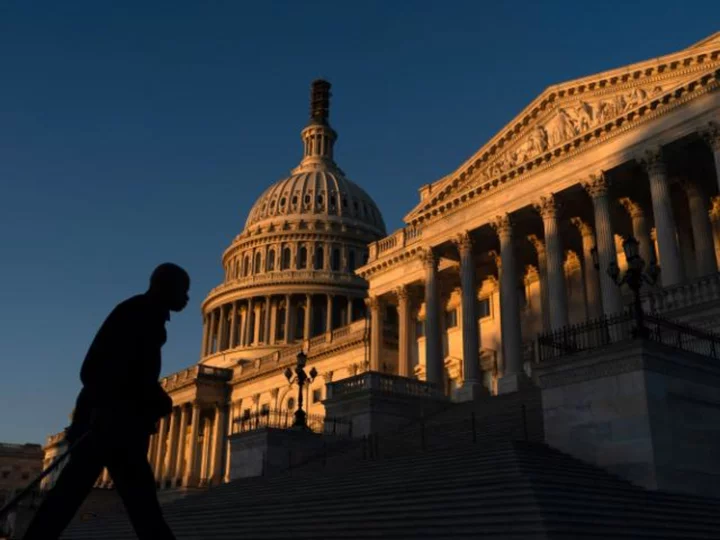Around the country, politicians are waging high-stakes battles over new congressional lines that could influence which party controls the US House of Representatives after the 2024 election.
In North Carolina, the Republicans who control the state legislature are crafting district lines that could flip as many as four Democratic-held seats. Democrats, meanwhile, could pick up seats in legal skirmishes now playing out in New York, Louisiana, Georgia and other states.
In all, the fate of anywhere from 14 to 18 House seats across nearly a dozen states could turn on the results of these fights. Republicans currently hold just a five-seat edge in the US House. That razor-edge majority has been underscored in recent weeks by the GOP's chaotic struggle to elect a new speaker.
"Given that the majority is so narrow, every outcome matters to the fight for House control in 2024," said David Wasserman, who follows redistricting closely as senior editor and elections analyst for The Cook Political Report with Amy Walter.
And with fewer competitive districts that swing between the political parties, Wasserman added, "every line change is almost existential."
Experts say several other factors have helped lead to the slew of consequential -- and unresolved -- redistricting disputes, just months before the first primaries of the 2024 cycle.
They include pandemic-related delays in completing the 2020 census -- the once-a-decade population count that kicks off congressional and state legislative redistricting -- as well as a 2019 Supreme Court ruling that threw decisions about partisan gerrymandering back to state courts.
In addition, some litigation had been frozen in place until the US Supreme Court's surprise ruling in June, which found that a Republican-crafted redistricting plan in Alabama disadvantaged Black voters in the state and was in violation of the landmark 1965 Voting Rights Act.
That decision "is functionally reanimating all of these dormant cases," said Adam Kincaid, the president and executive director of the National Republican Redistricting Trust, which supports the GOP's redistricting efforts.
Kincaid said it's too soon to tell whether Republicans or Democrats will emerge with the advantage by Election Day 2024. In his view, either party could gain or lose only about two seats over redistricting.
In many of the closely watched states where action is pending, just a single seat hangs in the balance, with two notable exceptions: North Carolina and New York, where multiple seats are at stake. Republicans control the map-drawing in the Tar Heel State, while the job could fall to Democrats in New York, potentially canceling out each party's gains.
"Democrats kind of need to run the table in the rest of these states" to gain any edge, said Nick Seabrook, a political scientist at the University of North Florida and the author of the 2022 book "One Person, One Vote: A Surprising History of Gerrymandering in America."
Here's a state-by-state look at recent and upcoming redistricting disputes that could shape the 2024 race for control of the US House:
Alabama
In one of the cycle's highest-profile redistricting cases, a three-judge panel in Alabama approved a map that creates a second congressional district with a substantial Black population. Before the court action, Alabama -- which is 27% Black -- had only one Black-majority congressional district out of seven seats.
The fight over the map went all the way to the Supreme Court -- which issued a surprise ruling, affirming a lower-court opinion that ordered Alabama to include a second Black-majority district or "something quite close to it." Under the map that will be in place for the 2024 election, the state's 2nd District now loops into Mobile to create a seat where nearly half the population is Black.
The high court's 5-4 decision in June saw two conservatives, Chief Justice John Roberts and Justice Brett Kavanaugh, side with the three liberals to uphold the lower-court ruling. Their action kept intact a key pillar of the Voting Rights Act: that it's illegal to draw maps that effectively keep Black voters from electing a candidate of their choice.
The ruling has reverberated around the country and could affect the outcome of similar court cases underway in Louisiana and Georgia that center on whether Republican-drawn maps improperly diluted Black political power in those states.
Given that Black voters in Alabama have traditionally backed Democrats, the party now stands a better chance of winning the newly reconfigured district and sending to of its members to Congress after next year's elections.
The new map -- approved in recent days by the lower-court judges -- also could result in two Black US House members from Alabama serving together for the first time in state history.
Florida
A state judge in September struck down congressional lines for northern Florida that had been championed by Gov. Ron DeSantis, ruling that the Republican governor's map had improperly diluted Black voting power.
This case, unlike the Alabama fight decided by the US Supreme Court, centers on provisions in the state constitution.
The judge concluded that the congressional boundaries -- which essentially dismantled a seat once held by Al Lawson, a Black Democrat, that connected Black communities across a northern reach of the Florida -- violated the state's Fair Districts amendments, enacted by voters. One amendment specifically bars the state from drawing a district that diminishes the ability of racial minorities "to elect representatives of their choice."
Arguments before an appeals court are slated for later this month, with litigants seeking a decision by late November. The case is expected to land before the all-Republican state Supreme Court, where DeSantis appointees hold most seats.
A separate federal case -- which argues that the map violates the US Constitution -- is pending.
But observers say the outcome of the state litigation is more likely than the federal case to determine whether Florida lawmakers must restore the North Florida district, given the state constitution's especially strong protections for the voting rights of racial minorities and the lower burden of proof required to establish that those rights were abridged.
Georgia
A redistricting case now before a federal judge could create a more competitive seat for Democrats in the Atlanta suburbs.
The plaintiffs challenging the congressional map drawn by Georgia Republicans argue that the increasingly diverse population in the Peach State should result in an additional Black-majority district, this one in the western Atlanta metro area. A trial in the case recently concluded and awaits a final ruling by US District Judge Steve Jones.
In 2022, Jones preliminarily ruled that some parts of the Republicans' redistricting plan likely violated federal law but allowed the map to be used in that year's midterm elections.
A separate federal case in Georgia challenges the congressional map on constitutional grounds and is slated to go to trial next month.
Currently, Republicans hold nine of the 14 seats in Georgia's congressional delegation. Black people make up a majority, or close to it, in four districts, including three in the Atlanta area.
Kentucky
The Kentucky Supreme Court could soon decide whether a map drawn by the state's Republican-controlled legislature amounts to what Democrats assert is an "extreme partisan" gerrymander in violation of the state's constitution.
Much of the case focuses on disputes over state legislative maps, but the congressional lines also are at stake, with critics saying lawmakers moved Kentucky's capital city -- Democratic-leaning Frankfort -- out of the 6th Congressional District and into an oddly shaped -- and solidly Republican -- 1st District to help shore up Republican odds of holding the 6th District.
The 6th District, represented by GOP Rep. Andy Barr, was one of the more competitive seats in Kentucky under its previous lines. (Democrat Amy McGrath came within 3 points of beating Barr in 2018; last year, Barr won a sixth term under the new lines by 29 points.)
A lower-court judge already has ruled that the Republican-drawn map does not violate the state's constitution.
Louisiana
The Supreme Court's decision in Alabama could pave the way for a new congressional map in Louisiana ahead of the 2024 election, but the case has quickly become mired in appeals.
Although Black people make up roughly a third of the state's population, Louisiana has just one Black lawmaker in its six-member congressional delegation.
A federal judge threw out the state's Republican-drawn map in 2022, saying it likely violated the Voting Rights Act. Republican officials in the state appealed to the US Supreme Court, which put the lower-court ruling on hold until it decided the Alabama case, which it did in June this year.
Once the high court weighed in on the Alabama case, the legal skirmishes again lurched to life in Louisiana.
Louisiana Republicans have filed an appeal with the 5th US Circuit Court of Appeals and successfully halted a district court hearing to discuss imposing a new, court-ordered map.
On Thursday, the US Supreme Court declined to allow the federal district judge to move forward with discussions about drawing a new map while the appeal advances through the courts.
GOP state officials say, among other things, that they are seeking time to redraw the map themselves. Critics of the state's original map argue that Republicans are using legal maneuvers to delay a new redistricting plan, which could result in a second Democratic-leaning seat.
Legal battles that drag on risk judges invoking the so-called Purcell Principle, a doctrine that limits changing voting procedures and boundaries too close to Election Day to guard against voter confusion.
"Some of the reason it becomes too late is because, in many of these cases, the state is prolonging the litigation ... and buying more time with an illegal map," said Kareem Crayton, senior director for voting and representation at the liberal-leaning Brennan Center for Justice.
New Mexico
Republicans in New Mexico say the congressional lines drawn by the Democrats who control state government amount to an illegal gerrymander under the state's constitution.
At stake: a swing district along the US border with Mexico. If Republicans prevail, the seat -- now held by a Democratic Rep. Gabe Vasquez -- could become more favorable to Republicans.
A state judge recently upheld the map drawn by Democrats, but the New Mexico Supreme Court is expected to review that order on appeal.
New York
Republicans flipped four US House seats in New York in the 2022 midterm elections, victories that helped secure their party's majority in the chamber.
Current legal fights in the Empire State over redistricting, however, could erase those gains.
A state court judge oversaw last year's process of drawing the current map following a long legal battle and the inability of New York's bipartisan redistricting commission to agree on new lines. But Democrats scored a court victory earlier this year when a state appellate court ruled that the redistricting commission should draw new lines.
Republicans have appealed that decision, and oral arguments are set for mid-November before New York's Court of Appeals, the state's highest court. The commission's map-making also is on hold.
If Democrats prevail, it could make it easier for their party to pick up as many as six seats now held by Republicans.
North Carolina
North Carolina's legislature, where Republicans hold a supermajority, is drawing new congressional lines that observers could prove a windfall for the GOP and boost the party's chances of retaining its House majority next year.
The state's current House delegation is split 7-7 between Democrats and Republicans.
Two proposed maps released in recent days, however, would put three House Democrats in "almost impossible to win" districts, said Chris Cooper, a political science professor and redistricting expert at Western Carolina University.
The affected Democrats would be Reps. Jeff Jackson, who currently represents a Charlotte-area district; Wiley Nickel, who holds a Raleigh-area seat; and Kathy Manning, who represents Greensboro and other parts of north-central North Carolina.
One of the plans under consideration could also knock off a fourth Democrat because it would draw two of the state's three Black House lawmakers -- Reps. Don Davis and Valerie Foushee -- into the same district. Under the other proposal, Davis would not face off against Foushee, but his seat would become more friendly toward Republicans while remaining competitive for both parties.
State-level gains in the 2022 midterm elections have given the GOP new sway over redistricting in this swing state. Last year, Republicans flipped North Carolina's Supreme Court, whose members are chosen in partisan elections. The new GOP majority on the court this year tossed out a 2022 ruling by the then-Democratic leaning court against partisan gerrymandering.
A map that had been created after the Democratic-led high court's ruling resulted in the current even split in the state's House delegation.
Democratic Gov. Roy Cooper does not have veto power over redistricting legislation.
South Carolina
A redistricting case pending before the US Supreme Court centers on the future of a Charleston-area seat held by Republican Rep. Nancy Mace, who made headlines recently for joining House GOP hard-liners in voting to remove Kevin McCarthy as speaker.
Earlier this year, a three-judge panel concluded that lines for the coastal 1st Congressional District, as drawn by state GOP lawmakers, amounted to an unconstitutional racial gerrymander.
The Republican lawmakers appealed to the US Supreme Court. And, during oral arguments earlier this month, several justices in the court's conservative majority expressed skepticism that South Carolina officials had engaged in an improper racial gerrymander and seemed inclined to reinstate the lawmakers' map.
Utah
The state Supreme Court, in a case it heard in July, is considering whether it even has the authority to weigh in on map-drawing decisions by the GOP-controlled state legislature.
Republican state officials argue that the court's power over redistricting decisions is limited.
Advocacy groups and a handful of voters are challenging a congressional map that further carved up Democratic-leaning Salt Lake County between four decidedly Republican districts.
Doing so, the plaintiffs argued in their lawsuit, "takes a slice of Salt Lake County and grafts it onto large swaths of the rest of Utah," allowing Republican voters in rural areas and smaller cities far away from Salt Lake to "dictate the outcome of elections."
Other states
Redistricting fights over congressional maps are ongoing in several other states -- ranging from Texas to Tennessee -- but those cases might not be resolved in time to affect next year's elections.









